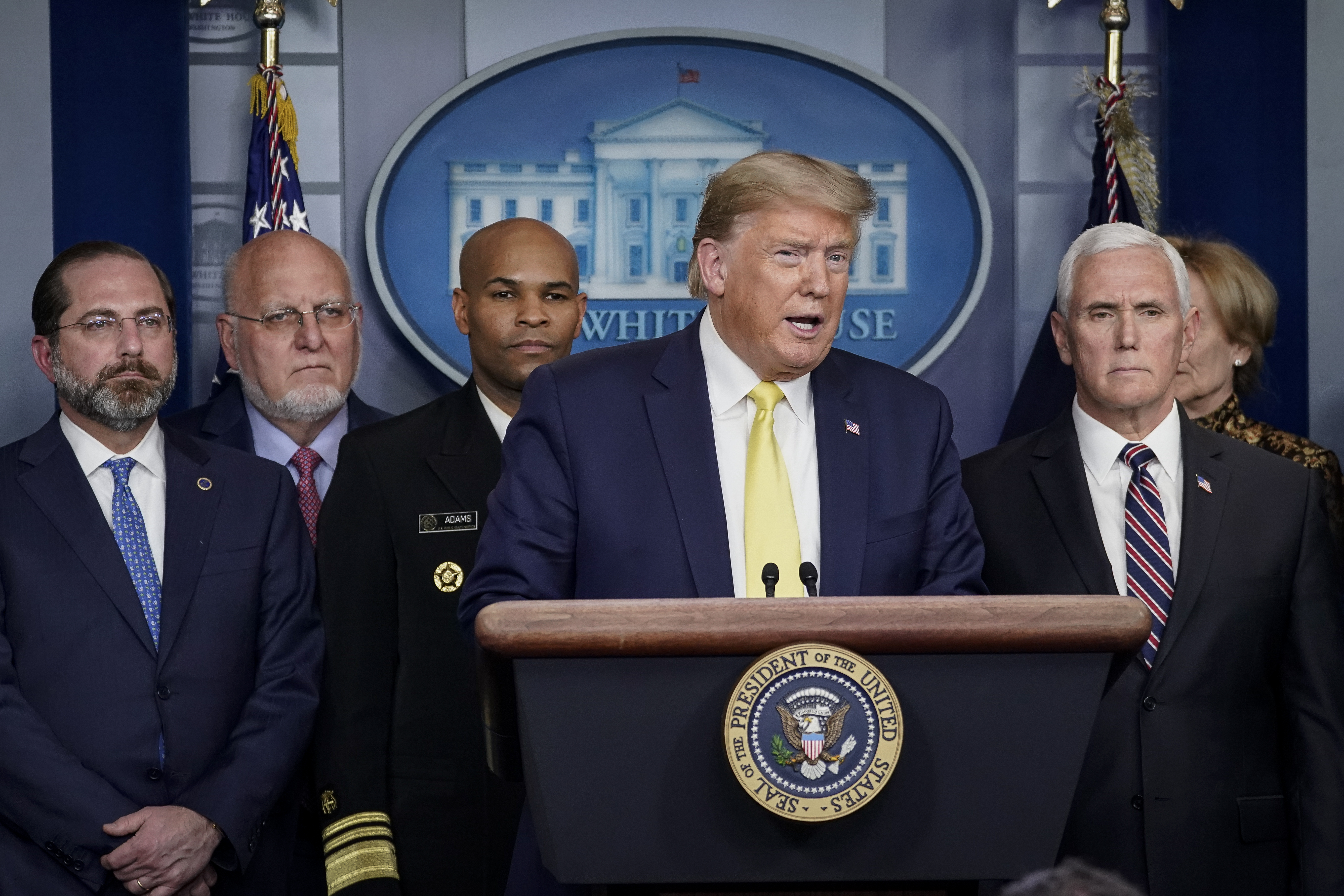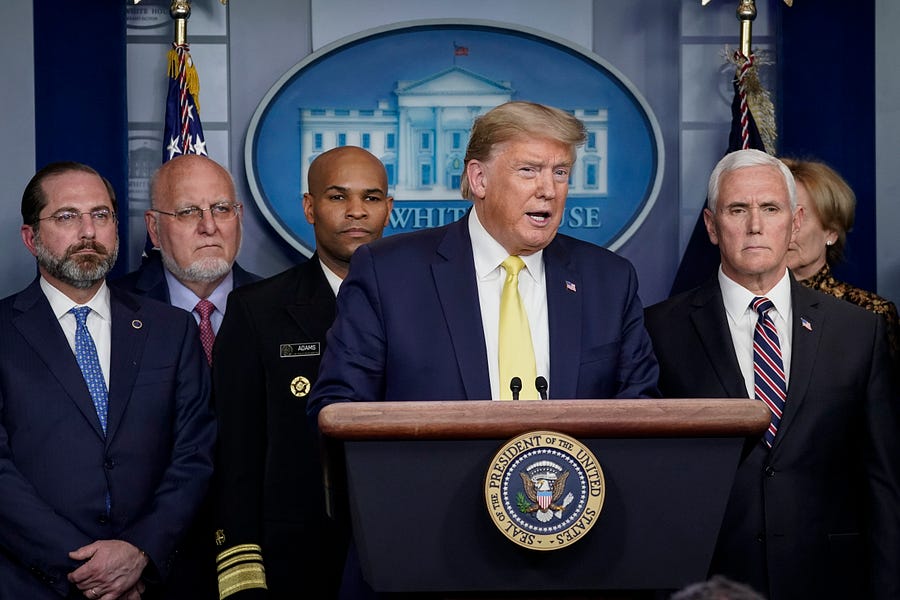Happy Tuesday! If you pick up on some frustration in the tone of today’s newsletter, Declan is still seething over how Peter’s mom treated Madison on The Bachelor last night. If Madi doesn’t win the whole thing, we’re canceling tomorrow’s TMD. [Editor’s Note: We’re not. Nobody else here cares about The Bachelor.]
Quick Hits: Today’s Top Stories
-
Six states go to the polls in the Democratic primary, and Joe Biden can build a near-insurmountable delegate lead over Bernie Sanders with a strong showing.
-
Four more members of Congress are self-quarantining after discovering they interacted last week with citizens who later tested positive for COVID-19. Rep. Doug Collins, Rep. Matt Gaetz, and Rep. Mark Meadows—who has tested negative—believe they came in contact with a carrier at CPAC, while Rep. Julia Brownley did not announce how she encountered the disease.
-
Gov. Steve Bullock of Montana announced he will run for GOP Sen. Steve Daines’ seat this November. Bullock, who is highly popular in the state, previously sought the 2020 Democratic presidential nomination before dropping out in December.
-
Despite pledging publicly to cooperate fully, Prince Andrew has “completely shut the door” on U.S. prosecutors investigating the case of the late Jeffrey Epstein, a U.S. attorney said Monday. Epstein reportedly killed himself last year while awaiting trial on sex trafficking charges.
-
A health care business with ties to Joe Biden’s brother James was raided by the FBI in late January.
-
A Tennessee hospital has announced it will not charge medical fees for patients affected by the tornadoes that killed 24 in the Nashville area last week.
Is it Time for a Stimulus Package?

Speaking to reporters at a coronavirus task force briefing on Monday night, President Trump said his administration plans to discuss with congressional leaders measures the federal government can take to mitigate the economic fallout of the COVID-19 outbreak. Some items the White House will bring to the table: A payroll tax cut, cash assistance to hourly wage earners, loans for small businesses struggling with liquidity, and relief for the airline, hotel, and cruise industries. Trump reiterated that he didn’t want American workers and businesses to “get penalized for something that’s not their fault.”
The president’s comments came after the markets closed on another day of financial turmoil. The Dow Jones Industrial Average had its worst day since the 2008 financial crisis on Monday, dropping 7.8 percent. The 10-year U.S. Treasury yield briefly hit an all-time low of 0.318 percent in overnight trading. Oil prices fell more than 24 percent, with some markers registering their biggest intraday losses since 1991.
But perhaps of even greater economic significance are the continued institutional closures and cancellations sweeping across the country: Small businesses reeling after expected revenues vanished, parents scrambling to find childcare for their kids after schools were shuttered, service or gig economy workers forced to choose between safeguarding their health and paying the bills.
And that’s where fiscal stimulus efforts come in.
When an economy lags, governments often put together stimulus packages—typically containing tax cuts, federal spending, and other various incentives—in an effort to emulate consumer demand and jumpstart commercial activity. The United States passed two such packages in 2008 and 2009 in attempts to stave off the worst of the most recent financial crisis: The $152 billion Economic Stimulus Act was signed into law by President George W. Bush in February 2008; President Barack Obama approved the $787 billion American Recovery and Reinvestment Act (the Recovery Act) a year later in February 2009.
President Trump’s comments last night—along with a series of proposals put forth by Speaker Pelosi and Senate Minority Leader Chuck Schumer—indicate some sort of package could be on the horizon, should Senate Republicans decide to play ball.
If you’re interested in the fiscal fallout of COVID-19, Declan has a full piece on the matter—featuring insights from former Bush administration official Tony Fratto and American Enterprise Institute’s Michael Strain—up on the site today. Check it out here.
What the Medical Experts Are Saying
It’s worth remembering that the markets are in turmoil not only because of how the disease has already affected the global economy—trade disruptions, lower demand for oil, the damage to the travel industry—but because of uncertainty of how it will affect areas that are just starting to see cases. The health of millions of people is at stake. We also talked to medical experts about why the coronavirus is more worrisome than a simple seasonal flu, and what factors will determine whether the next few months will be just a period of national turbulence or a full-blown disaster:
-
Why is it that, as Trump says, “life & the economy go on” despite tens of thousands of annual flu deaths? Primarily because the seasonal flu is, well, seasonal. Hospitals and medical centers know roughly how much of it to expect each year, and they’re able to plan accordingly. Many people die, yes but that’s rarely due to a lack of sufficient medical resources or care.
-
A sudden epidemic of something like the coronavirus, by contrast, is impossible to plan for. At any given time, especially during flu season, most hospitals are already operating near their peak capacity for diseased patients. Operating under the assumption that a mass outbreak is always right around the corner just isn’t economically feasible in many places.
-
One Northern Virginia doctor, who has been coordinating coronavirus response for his practice and asked to be quoted anonymously to speak candidly, put it this way: “The big concern among everybody right now is that in a couple weeks’ time—this virus notably has a very delayed onset of some of the more severe symptoms—that we won’t be able to have the capacity, especially of intensive care units, but even hospital beds in general, to be able to get people the support that they need to get through this.”
-
“That’s what’s giving most health care providers the most concern,” Dr. Megan Ranney, an emergency physician who teaches at Brown University, told The Dispatch. “We’re going to have a lot of people exposed to a virus they’ve never seen before. And if that exposure happens really quickly, our emergency departments and hospitals face the risk of being overwhelmed. And then we won’t be able to take care of the people having the regular illnesses, like heart attacks and strokes and appendicitis. We will already be at capacity.”
-
But the news isn’t all grim: All the active measures doctors are recommending to help stop the spread of the disease—avoiding large gatherings, beefing up personal hygiene, staying home if you start to feel sick—won’t only help diminish the total number of Americans who catch the coronavirus. Just as importantly, such measures help to slow the advance of the disease, spreading the load of cases over a longer and more manageable period of time. The more conscientious Americans are about this, the less risk of hospitals being overwhelmed by sudden spikes.
The rest of Andrew’s piece is available on the website here.
Worth Your Time
-
As the novel coronavirus has spread, it’s inevitably drawn comparisons to other heavyweight pathogens humanity has battled in recent years: bird flu, swine flu, SARS, MERS, ebola, zika. But there’s another—hopefully too fatalistic—comparison that can be made: The Spanish flu, which swept across the world in 1918, killing between 20 and 40 million people. If you’re not sick of the subject by now, it’s worth taking a few minutes to read this definitive 1997 New Yorker piece on the subject by Malcolm Gladwell. Apart from being a fascinating read, it’s a great motivator to keep washing your hands!
-
Before his sudden Super Tuesday collapse, Mike Bloomberg’s campaign was making headlines for the plum salaries it was paying staffers. Turns out that the Bloomberg influencers-in-residence had a pretty sweet gig too: Kaleigh Rogers of FiveThirtyEight interviewed an 18-year-old who got paid $83 a day by the campaign, regardless of how long he worked or if he even worked at all. The kid says he worked about 10 hours a week sending texts and making phone calls, and found the job a great way to supplement his minimum-wage tutoring work. One stand-out quote: “I actually did work but I think I could have, honestly, done no work and still gotten paid for this campaign…They had no way of tracking. There was no enforcement system.”
Presented Without Comment
Presented Without Comment: Self-Quarantine Edition
Something Fun
Led Zeppelin fans can breathe easy today: a U.S. appeals court has determined that the iconic British band did not steal the iconic acoustic lick found in 1971’s “Stairway to Heaven” from the Los Angeles band Spirit.
Toeing the Company Line
-
The latest Advisory Opinions podcast is out. Sarah and David preview today’s primaries and discuss coronavirus, the Trump campaign’s lawsuits against news outlets, and the execution of Nathaniel Woods.
-
You know the math is bad, but you might not know how bad. If you missed it yesterday, be sure to read Brian Riedl’s piece for the site detailing just how far the nation is from being able to pay for Bernie Sanders’s proposed $97 trillion legislative agenda.
Reporting by Declan Garvey (@declanpgarvey), Andrew Egger (@EggerDC), Sarah Isgur (@whignewtons), and Steve Hayes (@stephenfhayes).
Photograph by Drew Angerer/Getty Images.






Please note that we at The Dispatch hold ourselves, our work, and our commenters to a higher standard than other places on the internet. We welcome comments that foster genuine debate or discussion—including comments critical of us or our work—but responses that include ad hominem attacks on fellow Dispatch members or are intended to stoke fear and anger may be moderated.
You are currently using a limited time guest pass and do not have access to commenting. Consider subscribing to join the conversation.
With your membership, you only have the ability to comment on The Morning Dispatch articles. Consider upgrading to join the conversation everywhere.